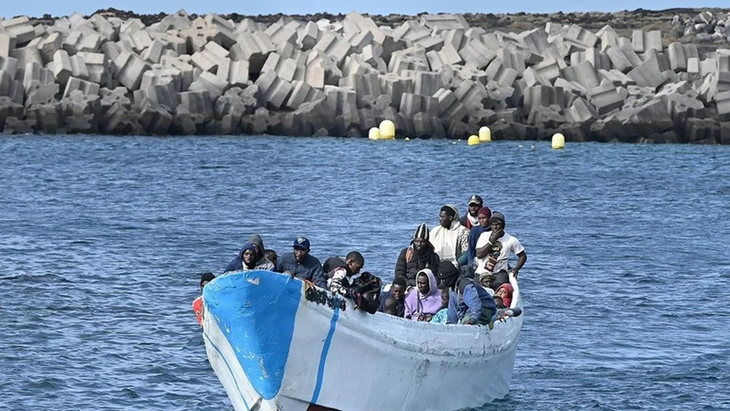(VOVWORLD) - The European Parliament (EP) approved the Pact on Migration and Asylum on Wednesday. This is a historic step to address one of the EU’s biggest challenges of the decade.
 Migrants are brought to La Restinga port, Canary Islands, Spain, after being rescued at sea. (Illustrative photo: AFP/VNA) Migrants are brought to La Restinga port, Canary Islands, Spain, after being rescued at sea. (Illustrative photo: AFP/VNA) |
The new Pact is a complex package of reforms focused on a sharing of responsibility and speeding up the screening procedure for migrants and refugees.
Historic step
Under the Pact, the EU will develop a pre-entry screening procedure which includes identification, collection of biometric data, and health and security checks. Based on this data, which will be stored in the Eurodac database, people assessed as unlikely to be accepted for asylum will be placed in temporary reception centers while their applications are pending (no more than 7 days). If rejected, they will quickly be sent back to their place of origin.
A notable point of the new Pact is sharing responsibility among EU countries. The "Dublin system" will remain valid, which stipulates that the first safe country a person enters is responsible for processing their asylum application. The new Pact legally obliges EU countries to participate in receiving and resettling migrants, refugees, and individuals entitled to international protection. A country that turns away migrants must provide financial, material, and technical support to the front-line countries.
This is a particularly important change because arguments over refugee "quotas" caused serious division within the EU during the 2015-2016 refugee crisis, when many countries, such as Hungary, Poland, the Czech Republic, and Slovakia (known as the Visegrad group) resolutely refused to accept refugees, while Italy, Greece, and Spain had to accept hundreds of thousands of people.
The new Pact on Migration and Asylum is considered a great political success for the EU, two month before the European Parliament elections in June. EP President Roberta Metsola said this is a historic milestone after 8 years of deadlock.
“We have voted in favor of the package that provides for a robust legislative framework that is the same in all member states, that puts humanity first, that understands all the different, difficult aspects of this issue, that provides clarity of applicable rules, that ensures the right balance between solidarity and responsibility,” said Metsola.
Many European leaders, including President of the European Commission Ursula von der Leyen and German Chancellor Olaf Scholz, praised the new Pact as an important step forward for Europe in dealing with the wave of migration that has been increasing again in the past few years. Matteo Piantedosi, Interior Minister of Italy, the EU country that receives the most migrants and refugees, said the new Pact is a collection of "the best possible compromises" among EU countries at this time.
Controversy over migrants' rights
But the new Pact has also drawn many criticisms. Before and after the European Parliament's vote, 161 non-governmental organizations (NGOs) on human rights protection, including Amnesty International, the International Rescue Committee, and Oxfam, called on European parliamentarians to oppose the Pact, concerned that tightening regulations at the arrival countries will restrict the rights of migrants and refugees who are fleeing from war, oppression, and poverty.
Specific provisions on temporary detention, quick review of documents, acceleration of deportation, and repatriation have been criticized. Many organizations that defend the rights of migrants and refugees oppose the Pact, saying it was approved because of concerns about the growing influence of right-wing and populist parties before the European elections.
“We oppose the new Pact because nothing will be improved. Many things will be worse when human rights are limited. Migrants and refugees will face more dangers," said Johannes Rueckerl, spokesman for Seebrucke, an NGO for the rights of migrants.
Enforcing the new Pact will be difficult with EU countries like Poland continuing to oppose it. Some far-right and populist parties in other countries have criticized the document for not being tough enough. Observers say that when the Pact takes effect in 2026, Europe will continue to squabble over migration and asylum.